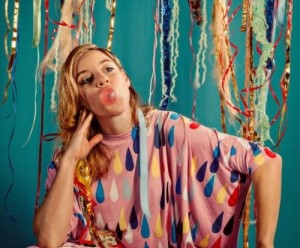
So it’s more doing something for you rather than doing something so that other people are watching you?
And for the community.
That’s a great quote about folk music because it’s not about the individual , it’s about this thing that is created when all these individuals are together. Talking about your parents. There’s been some discussion about you being brought up by ‘hippie parents’ and the way you were brought up affecting you musically. You’re mom was a piano teacher? It sounds like it was a very encouraging environment musically.
The ‘hippie-ism’ is a misnomer because I know people with actual hippie parents and they named their kids names like ‘Rainbow’ or ‘Starcrest’ and stuff like that.
I like ‘Sparrow’, that’s one of my favorites.
I love all the tree names like Aspen. My mom is a older than the hippie generation and she was also studying classical music all through the sixties, my dad maybe a little more could be classified as a hippie. I don’t think either of them smoked marijuana and it was more about being artsy, you know artists, being creative was encouraged in a massive way.
I pressed my mother to take piano lessons when I was six, and she was like ‘No it’s too soon’ and she thought it was a bad idea to be my mother and teach me. My dad was an architect and he’d come home from his corporate architecture job to go paint in our basement and my mom was always practicing. There were lots of vinyl LPs and lots of going to concerts. I think I saw a lot of really good music when I was too young to remember seeing it.
Where did you grow up?
I grew up mostly in Connecticut and then we lived in Poughkeepsie, New York for awhile.
Close to where Pete Seeger lived.
Exactly. I’m named for Phil Merrill, who was a folk musician. Music was all over the place. My parents were always going to over to friends’ houses to jam and friends were always coming over to our place, there was that folk music sense around: my mom playing accordion and my dad playing banjo.
Talk to me about your earnest and intense cult following. What’s the weirdest thing you’ve gotten from a fan?
Probably a very, very ornate charcoal portrait of myself. I don’t if that’s strange but that was just kind of unbelievable.
Any strange lyrical connections people have made with your songs?
That’s a good question. I often don’t know. Someone told me that they’d read somewhere that someone was interpreting the song Powa [off the album from 2011’s Whokill] as an anti-abortion song. That still blows my mind. I mean, it was appalling to me that someone could take that from my music but I do kinda love that it’s that open, and that obtuse, that open-ended. It’s not a smack-you-over –the-head, this-is-what-I’m-trying-to-say type of thing. These are words and images that will touch people in different ways.
So there is this element of joy in your songs that is common in folk music to an extent but not in modern music at all.
I mean you’re right, maybe it’s because of the ‘cool factor’ you know it’s so uncool to be happy. Happy exposes yourself. That’s is kind of why I like the Pharrell song Happy.
What do you hope and passion mean to you?
Hope for change, and passion for change too. To me, that is what I’m finding so refreshing about this album, that I’m founding transformation in it. It takes passion to want to change and to want things to improve and want the world to change.
—



